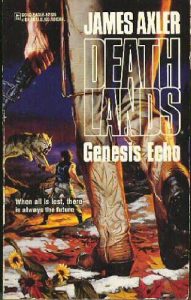 Cool story: Genesis Echo is either the third or fourth in a series of Deathlands cliffhangers, and pleasingly also the last. I mean, of the series of cliffhangers. There might be more cliffhangers later. There’s like a hundred books left in Deathlands the series.
Cool story: Genesis Echo is either the third or fourth in a series of Deathlands cliffhangers, and pleasingly also the last. I mean, of the series of cliffhangers. There might be more cliffhangers later. There’s like a hundred books left in Deathlands the series.
Anyway, aside from cliffhanger resolutions, this was mostly a medical horror story. Because, if you take a bunch of scientists from apocalypse era and mostly cut them off from everything for a hundred years (because that’s how they survive the post-apocalypse) but they lose a lot of their knowledge because of a fire, and also the world is terrible, but they’re determined to keep being scientists a hundred years later? Yeah, it’s like that.
So, different topic. A thing I like about these books that I probably haven’t mentioned yet is the willingness to do random things that feel more like real life than like a plotted book. In this case (spoilers, but you know you don’t care), last book and into this book, Doc (the guy from the 1890s who was pulled forward in time by scientists in the 1990s, but he was too much of a pain so they sent him forward another hundred years to the beginning of this series to get rid of him) met a nice lady while on walkabout in the mountains of western New Mexico, and brought her home to meet his friends. She was not fond of the idea of going into a teleporter (partly because, reasonably, she didn’t really understand what was going on) and ran away at the last second.
Her ultimate fate is unknown, but a chunk of her boot was left behind because it wasn’t clear of the teleport circle when the rest of them went off to the aforementioned medical horror story. So, like, did she live, or is there a border zone where you just get teleported into nothingness? If she did live, is she okay? Is she angry? Will they ever meet her again? I have no idea, and neither, for now, does the author. But someday, I bet I’ll get some kind of answer. Which, I’ve lost track of my point.
My point was, it doesn’t matter, it’s just a thing that happened and maybe they’ll never know, because usually you do never know. The only reason I think I’ll get an answer someday is because, like I said, there’s a hundred more books and that’s a long time to go without revisiting a person who left on a giant question mark.
I also still want them to go back to one of the space stations and/or moon bases that are out there that they found once before, but tragically depressurized and therefore not possible to explore. (Or, y’know, maybe people would still be alive if not. Well, descendants. Whatever. Either way, that would be cool.)
 I’ve been distracted lately.
I’ve been distracted lately. Cool story:
Cool story: 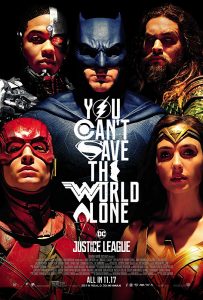 You may recall that
You may recall that 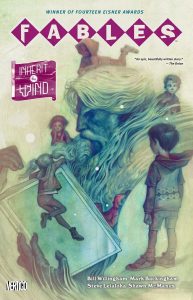 My favorite thing about Fables having
My favorite thing about Fables having 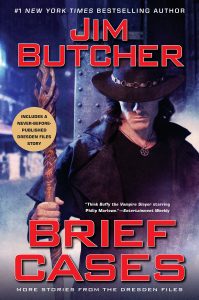 After a pretty long time, a new Dresden Files book! …well, kind of.
After a pretty long time, a new Dresden Files book! …well, kind of. 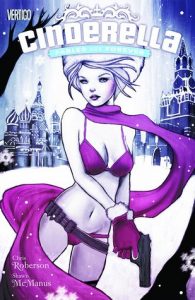 The first problem is, I don’t really remember what happened in
The first problem is, I don’t really remember what happened in 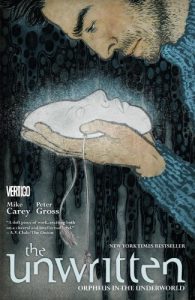 A common thread among the past several volumes of The Unwritten that I’ve read is this: I start off wondering if I’ve ever actually read the series before[1], and then over the course of the book things seem more familiar, and by the time I finish the book and look over my recent previous reviews, everything is more or less back in focus.
A common thread among the past several volumes of The Unwritten that I’ve read is this: I start off wondering if I’ve ever actually read the series before[1], and then over the course of the book things seem more familiar, and by the time I finish the book and look over my recent previous reviews, everything is more or less back in focus.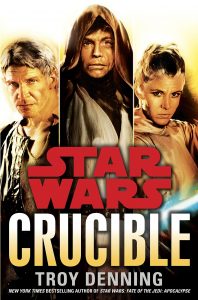 Crucible
Crucible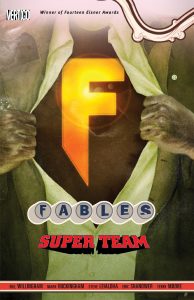 I’ve said it before about other series for sure (and probably this one for that matter), and I’m certain I’ll say it again: once you’re to Volume 16 of a series (not to mention its spin off from beginning to end), it is hard to say a damn thing without just an incredible number of spoilers. Enough so to make me wonder why I keep reviewing late volumes like this.
I’ve said it before about other series for sure (and probably this one for that matter), and I’m certain I’ll say it again: once you’re to Volume 16 of a series (not to mention its spin off from beginning to end), it is hard to say a damn thing without just an incredible number of spoilers. Enough so to make me wonder why I keep reviewing late volumes like this.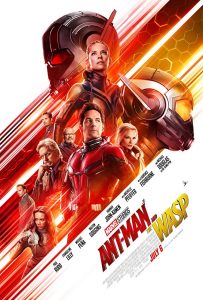 If I think about
If I think about